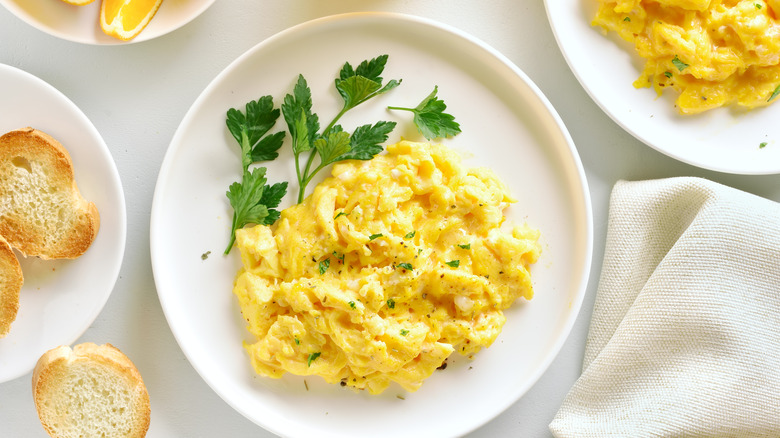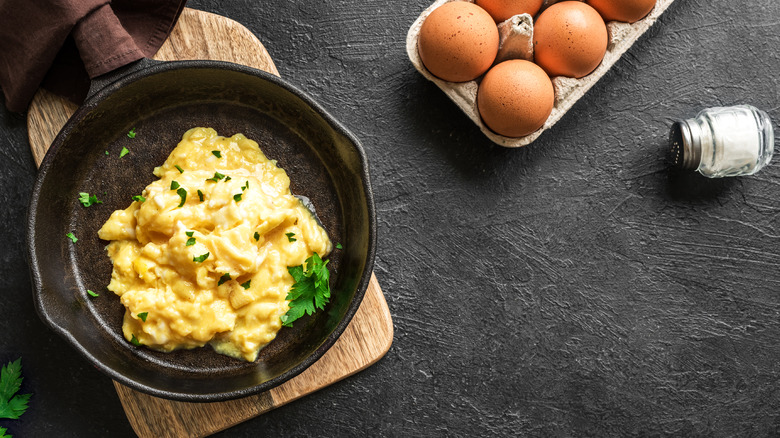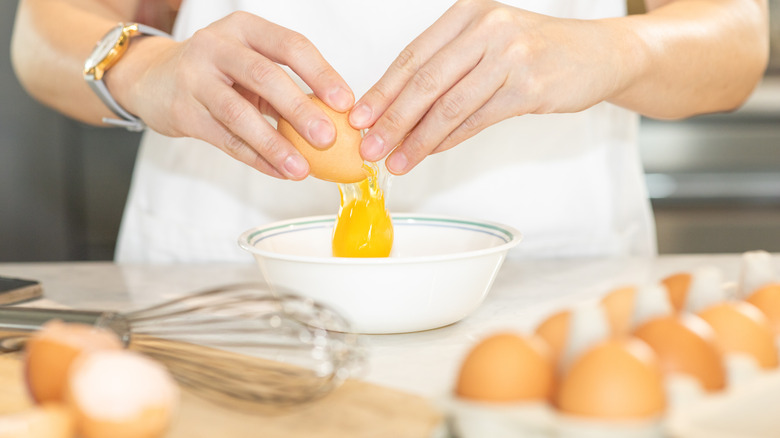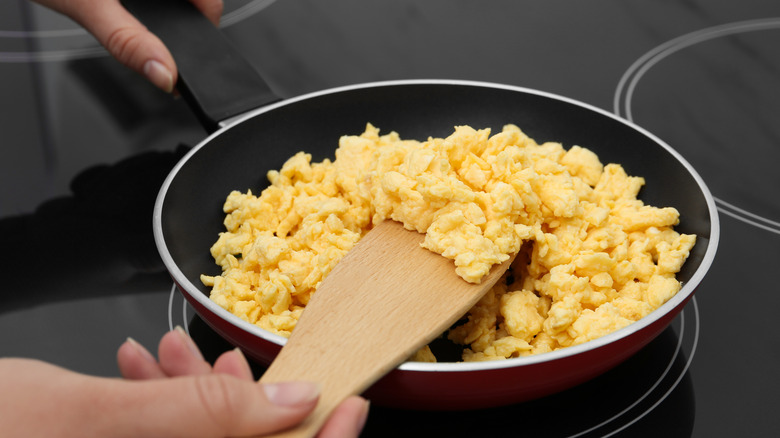Why You Should Never Melt Butter Before Making Scrambled Eggs
When it comes to the land of breakfast foods, eggs reign supreme. If you are a savory-over-sweet individual, nothing tastes better than hot eggs in the morning, whether you like them poached, scrambled, hard-boiled, or fried. Not only do they keep you feeling full longer than toast or cereal, but eggs also come in so many different flavors and varieties. From a luxurious eggs Benedict to a decadent shakshuka or a simple egg white omelet, you can order them in so many different combinations for a wildly different breakfast experience every time.
One of the best parts about eggs is that anyone can make them, even amateur home cooks. And it doesn't get much easier than whipping up a batch of scrambled eggs. All you need to do is crack open some shells, give your yolks a good stir, and scramble them on a stovetop — right?
But like many simple staples, scrambled eggs are easy to make but difficult to perfect. In a video posted by Fine Dining Lovers on YouTube, experts get into the best ways to nail this simple breakfast food. For one, if you've been melting the butter before scrambling eggs, you're doing it all wrong.
Cook your eggs and butter together for a better outcome
Whether you like your eggs soft and creamy or firm and fluffy, Fine Dining Lovers has all of the scrambling solutions for you. In the YouTube video "Flavor Hacking: How to Cook Eggs" Fine Dining Lovers' experts unpack the best ways to prepare a scrumptious plate of eggs, starting with how to pick the best ones and ending with the best ways to garnish them.
One of the key takeaways from the video is what to do with the butter when you begin cooking. Butter is a crucial ingredient in this classic breakfast food. As Fine Dining Lovers puts it, "Butter is what makes great scrambled eggs." After cooking experts completed thorough testing on 50 variations of the scrambled dish, they concluded that 2.5 grams of butter for each egg is the ideal ratio. Rather than melting the butter on the pan before chucking in your scrambled yolks, however, they suggest tossing the cold eggs and butter into the pan at the same time and cooking the two ingredients together simultaneously on a low heat. Why? "Controlling temperature is controlling the egg," they say, which allows you to have a better final product.
Another cooking myth that Fine Dining Lovers debunked? When scrambling your egg yolks, opt for a fork over a whisk. "The whisk will incorporate too much air. This makes the eggs rubbery." Duly noted!
Never salt raw eggs
When it comes to seasoning your scramble, you can never go wrong with a few shakes of salt to add a bit more flavor to your dish. However, don't be tempted to season your eggs too early. In fact, you should avoid salting raw eggs altogether. According to Fine Dining Lovers, salting raw eggs negatively affects the way that proteins form after the egg is heated.
Brent Hudson, the executive chef at Hole in the Wall NYC, concurs. "Adding salt in before the cooking process will break down the eggs and result in a watery scramble," he shared with Eat This, Not That!. And when the end goal is creamy and fluffy eggs, nothing sounds worse than a watery scramble.
Instead, hold off on seasoning until your eggs are cooked and ready to serve. Eat This, Not That! recommends keeping things simple and limiting your spices to some salt and fresh cracked pepper. For any adventurous eaters, Fine Dining Lovers recommends a sprinkle of brown butter for a nutty aftertaste or a fermented rice miso for a full-blown umami experience. If you're pairing your scramble with a few strips of bacon, adding a small amount of maple syrup will give your eggs a unique, smoky taste. Lastly, if you have multiple types of salt lying around the kitchen, Maldon salt is the way to go for scrambled eggs.
Keep the temperature on medium-low
One of the biggest mistakes you can make when it comes to scrambled eggs is scorching your dish with high heat. Even if you prefer your eggs on the firmer side, cooking your eggs using the highest of temperatures is a big no-no. According to Andrew Whitney, the executive chef and owner of Dell'anima in New York City, cooking your eggs on high heat is a one-way ticket to burning your scramble. "Keep [the pan] at a medium-low temp to make sure the eggs aren't overcooked," he said to Eat This, Not That!.
When it comes to cooking scrambled eggs, it's all about patience. While it might take longer to scramble your eggs on a lower heat, the end result will make all the difference. And as tempting as it might be, don't step away from the pan for long periods of time. "If [the eggs] sit in the pan while you are working on other breakfast foods, they will be cooked too much in some areas and not enough in others," Andrew Bland, owner of ART Catering and Events and The Purple Onion Café in North Carolina, said to Eat This, Not That!.
For smaller curds, stir your eggs constantly until they are ready to serve, suggests Bon Appétit. If you prefer a larger curd, you'll want to stir your eggs a little less.



